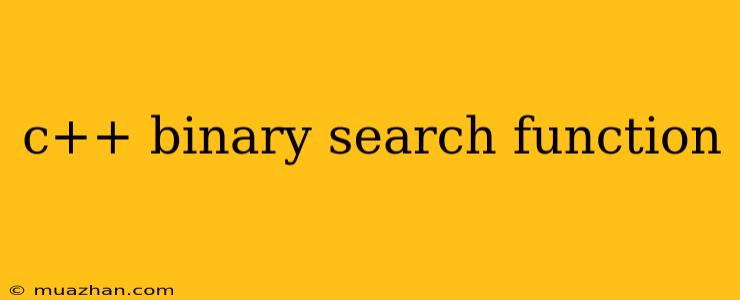C++ Binary Search Function
Binary search is a highly efficient algorithm for finding a specific element within a sorted array. It works by repeatedly dividing the search interval in half. This article will guide you through the implementation of a binary search function in C++.
Understanding the Algorithm
- Sorted Array: Binary search requires the input array to be sorted in ascending order.
- Divide and Conquer: The algorithm begins by comparing the target value with the middle element of the array.
- Three Possibilities:
- Match Found: If the target value matches the middle element, the search is successful.
- Target is Smaller: If the target value is smaller than the middle element, the search continues in the left half of the array.
- Target is Larger: If the target value is larger than the middle element, the search continues in the right half of the array.
- Recursive Process: Steps 2 and 3 are repeated recursively on the remaining half until either the target is found or the search interval becomes empty.
C++ Implementation
#include
using namespace std;
// Function to perform binary search
int binarySearch(int arr[], int left, int right, int target) {
while (left <= right) {
int mid = left + (right - left) / 2; // Calculate midpoint
// Check if the target value is found
if (arr[mid] == target) {
return mid;
}
// Adjust search interval based on comparison
if (arr[mid] < target) {
left = mid + 1; // Target is in the right half
} else {
right = mid - 1; // Target is in the left half
}
}
// Target not found
return -1;
}
int main() {
int arr[] = {2, 5, 7, 8, 11, 12};
int n = sizeof(arr) / sizeof(arr[0]);
int target = 12;
int index = binarySearch(arr, 0, n - 1, target);
if (index != -1) {
cout << "Target value found at index: " << index << endl;
} else {
cout << "Target value not found in the array." << endl;
}
return 0;
}
Explanation
-
binarySearchfunction:- Parameters: Takes the sorted array (
arr), left and right indices of the search interval (left,right), and the target value (target). - Iterative Approach: Uses a
whileloop to repeatedly divide the interval. - Midpoint Calculation: Calculates the middle index using
mid = left + (right - left) / 2to avoid integer overflow. - Target Comparison: Compares the target value with the element at the midpoint.
- Interval Adjustment: Updates the search interval based on the comparison result.
- Return Value: Returns the index of the target if found, otherwise returns -1.
- Parameters: Takes the sorted array (
-
mainfunction:- Initialization: Defines a sorted array, its size, and the target value.
- Function Call: Calls the
binarySearchfunction to locate the target. - Output: Prints the result indicating whether the target was found and its index.
Advantages of Binary Search
- Time Complexity: Has a logarithmic time complexity of O(log n), making it highly efficient for large datasets.
- Efficiency: Significantly faster than linear search, especially for large arrays.
- Wide Applicability: Used in various applications like searching in databases, dictionaries, and other sorted data structures.
Conclusion
This article provided a comprehensive understanding of the binary search algorithm and its implementation in C++. By following the principles of divide and conquer, binary search offers a highly efficient solution for searching within sorted arrays.
